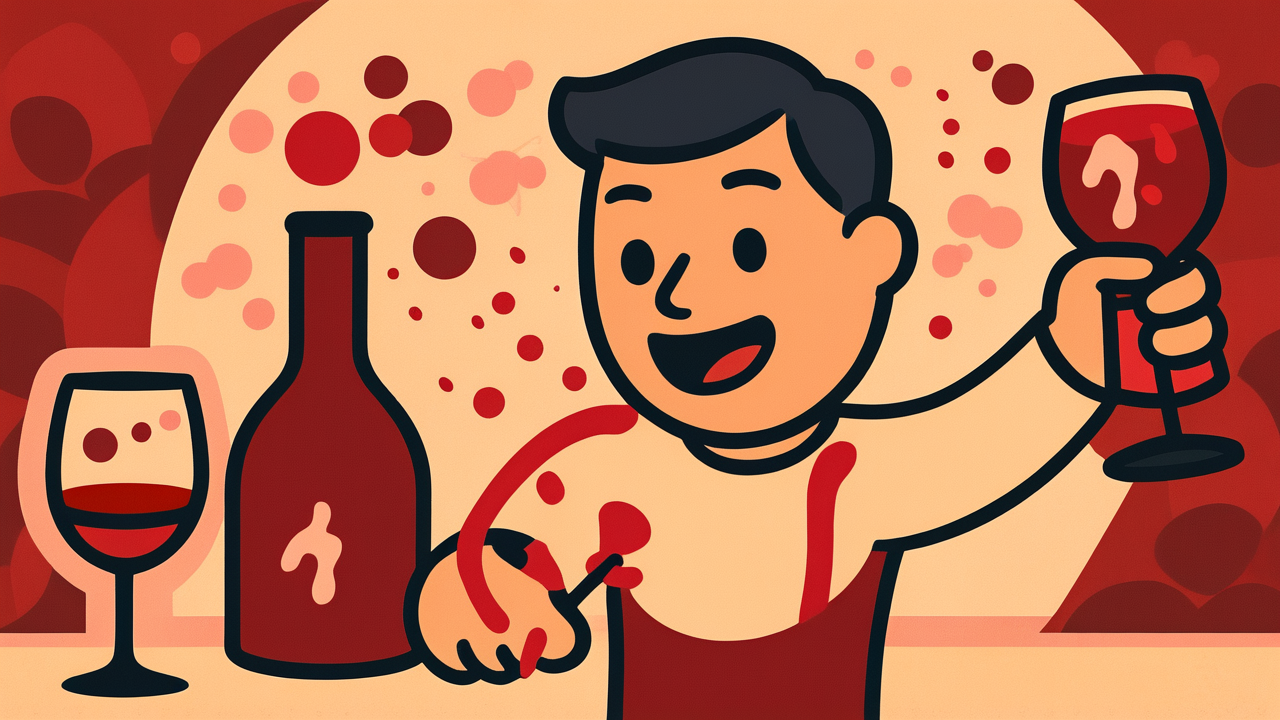How to Read “良いワインは良い血を作る”
Yoi wain ha yoi chi wo tsukuru
Meaning of “良いワインは良い血を作る”
“Good wine makes good blood” means that drinking quality wine in appropriate amounts improves blood quality and promotes health.
This expression is not simply advocating wine consumption, but teaches “the importance of consuming quality things appropriately.” While it is based on ancient medical knowledge and differs from modern nutritional science, it essentially contains the universal teaching that “choosing and consuming quality things leads to health.” It is used when discussing the quality of food and drinks, or when talking about healthy lifestyle habits. In modern times, there is scientific knowledge that antioxidants such as polyphenols contained in wine are good for health, so this saying is not completely wrong. However, it goes without saying that moderate consumption is a prerequisite.
Origin and Etymology
Actually, the expression “Good wine makes good blood” is not a traditional Japanese proverb. This is a phrase that came to Japan as a direct translation of the Western saying “Good wine makes good blood.”
The origin of this saying dates back to ancient Greek and Roman times. In the medicine of that era, the theory of “four humors” was mainstream, where human health was believed to be determined by the balance of four bodily fluids: blood, phlegm, yellow bile, and black bile. Within this theory, quality wine was believed to improve blood quality and promote health.
In medieval Europe, wine was valued as a daily beverage because water sanitation was poor. Particularly in monasteries, wine was positioned not only as a sacred drink but also as medicine for maintaining health. The idea that “Good wine makes good blood” became established within this historical context.
This saying was introduced to Japan from the Meiji period onward with the influx of Western culture. However, in Japan where sake culture was deeply rooted, it seems to have been used more as an expression to explain wine’s benefits rather than as a proverb.
Interesting Facts
In ancient Rome, it was common to drink wine mixed with water. Drinking pure wine as is was considered barbaric behavior, and educated people always diluted it with water. This custom influenced not only hygiene but also the idea that “Good wine makes good blood.”
In medieval monasteries, monks developed winemaking techniques and strived to improve quality as “God’s blessing.” Since they brewed wine with prayer and believed it created healthy bodies and souls, the spiritual aspect of this saying was also emphasized.
Usage Examples
- While savoring premium wine little by little, he remembered the words “Good wine makes good blood.”
- I’ve been drinking only cheap wine, but since “Good wine makes good blood,” I should splurge occasionally.
Modern Interpretation
In modern society, the saying “Good wine makes good blood” has gained new interpretation with the rise of health consciousness. Scientific research has revealed that resveratrol and polyphenols contained in red wine have positive effects on cardiovascular health, partially supporting this ancient saying with modern medicine.
However, views on alcohol consumption have also changed significantly in modern times. With increased awareness of alcohol’s health risks, the WHO (World Health Organization) has stated that “no safe level of alcohol consumption exists.” Therefore, caution is needed when taking this saying literally.
On the other hand, this saying aligns with modern values of “choosing quality things.” As more consumers focus on organic foods, additive-free ingredients, and fair trade products, the idea that “good things are good for the body” is widely accepted.
Also, in the SNS era, lifestyles that enjoy high-quality wine are attracting attention as symbols of “mindful living.” For modern people who emphasize quality over quantity, this saying functions not as mere advocacy for drinking, but as words expressing consciousness about quality in all aspects of life.
When AI Hears This
Scientific research has proven that resveratrol, a compound found in red wine, works to prevent the aging of blood vessels. This substance protects the cells that line the inside of blood vessels (vascular endothelium) and has the effect of smoothing blood flow.
The mystery of the “French Paradox” – where French people eat many fatty foods yet have low rates of heart disease – can actually be explained by the antioxidant effects of red wine. A component called polyphenols prevents “rust” in the body and suppresses inflammation in blood vessels.
Remarkably, research shows that people who drink moderate amounts of red wine (about one glass per day) have approximately 20% lower risk of cardiovascular disease compared to those who don’t drink at all. This is because the alcohol in wine itself has the effect of increasing good cholesterol.
Even more fascinating is that resveratrol activates what are called “longevity genes” – the sirtuin genes. In other words, it has the potential to slow aging at the cellular level.
However, these effects are premised on “moderate amounts.” Drinking too much produces the opposite effect. It’s truly amazing that the wisdom ancient people intuitively grasped – that “good wine makes good blood” – is now being confirmed by modern molecular-level research.
Lessons for Today
What the saying “Good wine makes good blood” teaches modern people is the importance of “a lifestyle that emphasizes quality.” In our busy modern society, we tend to prioritize cheapness and convenience, but this phrase reminds us of the importance of cultivating an eye for truly valuable things.
This is not limited to wine. In all aspects of life—food, relationships, work, hobbies—we need the ability to discern “good things.” Good things may sometimes be expensive or take time to obtain, but they enrich our hearts and bodies.
This saying also teaches the importance of “moderation.” No matter how good something is, excessive consumption becomes harmful. The wisdom to maintain balance and discern what is truly necessary for oneself is important. For modern people, this ancient saying can be considered a valuable phrase that provides an opportunity to think about “what richness truly means.”



Comments